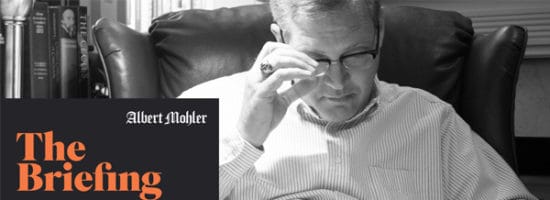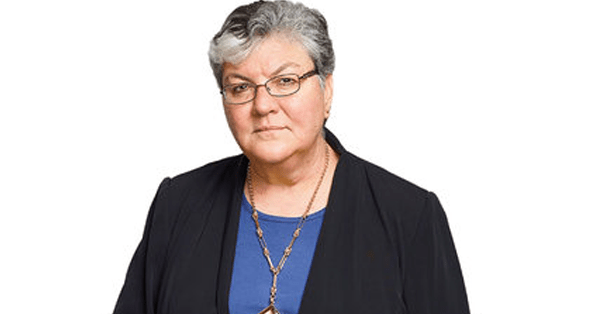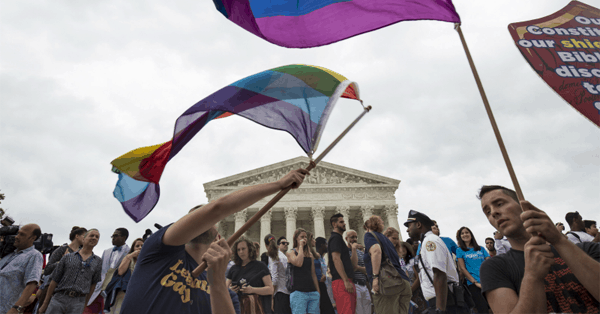Podcast: Play in new window | Download
Subscribe: RSS

MORAL LOGIC IN FL MARRIAGE LAW DEFIES LOGIC OF THE SEXUAL REVOLUTION TO PROTECT CHILDREN
The front page of yesterday’s edition of The Palm Beach Post included one of those articles that get your attention precisely because it first appears so very odd, so very out of sync with our contemporary times and on the other side of this moral revolution. Jane Musgrave was the reporter. The headline,
“Biological dad has no rights to child born during affair.”
“When Christopher Farrell learned his girlfriend was pregnant, he was ecstatic. He painted the walls of a bedroom in his Loxahatchee house blue and filled them with lovable characters from the Disney classic, ‘The Lion King.’
“Weeks before his son’s August 2015 birth, he summoned his family to a baby shower to have them celebrate his good fortune. His girlfriend, who was at the top of the guest list, never showed up. Inexplicably, she didn’t return his phone calls or texts.
“While Farrell didn’t know it at the time, it marked the end of his hopes of experiencing the joys of fatherhood.”
She explains that even though there is no question that Farrell is the child’s biological father, he has absolutely no right to see him, to talk to him, to support him or to help raise him. Why? Because Farrell’s girlfriend was married by the time the child was born and, according to Florida law, if the mother and her married husband intend to raise the child and take responsibility for it, the biological father has absolutely no rights whatsoever.

This kind of story makes the front page of a newspaper because it seems to make news. In other words, it is intended to signal the fact that it would be news to the people who read the paper, to the citizens of Florida, to know that their state privileges marriage to such an extent that if a woman bears a child and her husband recognizes it, it really doesn’t matter what the genetics might demonstrate and it really doesn’t matter if another man is the biological father. That biological father, because of the preeminence of marriage in Florida law, has absolutely no standing whatsoever.
Musgrave also has to explain the reason behind the law, this very long standing law. That reason, of course, is the state of Florida’s interest in children being recognized as legitimate. The article cites a family law attorney in Orlando, Susan Savard, who said,
“If the child is born in an intact marriage and if the husband and mother want to remain married, the biological father has zero rights.
“It’s well-settled law, said Elisha Roy, a West Palm Beach family law attorney. It might seem quaint to quibble about out-of-wedlock births in 2017, when divorce is common, 40 percent of children are born to single mothers and the country has embraced various non-traditional families, including those headed by unmarried, transgender and gay couples. But, antiquated or not, Florida law is steeped in the notion that no child should suffer the stigma of illegitimacy.”
Attorney Roy explained, “The big issue, the underlying theme in Florida, is about a child’s right to legitimacy, so no one should be able to come in and disrupt the sanctity of the marriage.”
He went on to say, “It’s not the dad’s right to be a dad, it’s the child’s right to have legitimacy.”
That’s an amazing statement, and the paper is exactly right. This law, given the contemporary moral revolution we’ve been experiencing, does seem to be rather quaint. It does seem somewhat out of step that the state of Florida should hold to such a conservative position when it comes to the question of whether a biological dad can have any kind of parental rights when the state of Florida recognizes same sex unions and allows gay adoptions and any number of other permutations, but nonetheless, this story made the front page for precisely that reason.
The biological father, in this case the man who is being denied absolutely any parental rights, is making the very point that the moral revolution renders this law sadly out of date. We can understand, at least in theory, even if we surely do not sympathize with this man’s argument, that this particular statute in Florida law is out of step with the rest of the state’s joining of the moral revolution.
The state recognizes same sex marriage, has done so ever since the Supreme Court’s of Obergefell decision. The state allows openly gay adoptions. The state allows test tube babies. The state allows any number of new reproductive technologies, but the state does not allow a biological father to claim a parental right if the mother is legally married at the time the child is born and if her husband takes responsibility with the woman to raise the child.
A Florida judge recently rejected Farrell’s plea for parental rights stating,
“Where the paternity of a child born into an existing marriage has been so acknowledged and where the husband and wife have decided to raise the child of their marriage and to accept all the rights and responsibilities of parenthood, a man who may have contributed his DNA to a child has no statutory or constitutional right to intrude into the private decision.”
Finally it’s also interesting in this story to note that no one on either side of the argument expects the law in Florida to be either revised or openly challenged any time soon. Why? Because this particular statute and the moral logic embedded in it, the privileging of the rights of the child to be legitimate, is an overriding concern that no one basically wants to take on politically in the state of Florida or likely elsewhere. That, of course, from a worldview perspective raises a most interesting dimension. There is a moral logic embedded in this law. There is a great deal of understanding concerning the rights of the child as being paramount and the institution of marriage as being fundamental. Put them together and the right of the child to be legitimate and the rights of a husband and a wife to the integrity and sanctity of their marriage overrides virtually everything else.
The reason I raise this is simply to make the observation that that moral logic that stands in this statute, a moral logic that is rather unassailable in the statutory law of Florida, reflects a moral wisdom that would have found its way in virtually every human society we know of, even before this case was ever envisioned. The reason for that is very clear. At the center of this case and of the moral logic of this statute is the integrity and sanctity of marriage and the wellbeing of the child and the right of the child to have parents, legally married parents.
Consider the fact that this statute now stands and not only does it stand, it has been very clearly applied. Then understand how we have rejected the very same moral logic, how we have undermined marriage and how we have sidelined the interest of the child in favor in other cases of the interest of adults.
Remember that line, “It’s not about the right of a dad to be a dad, but instead about the right of a child to be considered legitimate”? Just consider how we have rejected that very same logic when it comes to any number of other fronts in the moral revolution.
RELIGIOUS LIBERTY IN THE MILITARY: CHAPLAINS SHOULDN’T HAVE TO CHOOSE WHETHER TO SERVE GOD OR THE ARMY
Next I turn to yesterday’s edition of the New York Times Sunday magazine. On the back page of every weekly edition of that magazine there is generally a personal feature. In this case it was an interview conducted by Ana Marie Cox of a woman by the name of Sue Fulton. She’s identified as chairwoman of the US Military Academy Board of Visitors. She was, we are told, a founding member of OutServe, an advocacy group for LGBT soldiers. Now keep that in mind, remembering that Fulton is chairwoman of the US Military Board of Visitors, and then consider what’s at the very end of this interview. The question is this:
“The Vice President elect,” of course that’s Governor Pence, “has a position on what he calls religious liberty which allows citizens to refuse to do business with people with whom they have a sincere religious objection. This has also popped up in the military, right?”
That’s the question posed by Ana Marie Cox to Sue Fulton. Now, just notice that in the question we are told that religious liberty is what Vice President Michael Pence calls the reality. It’s what he calls religious liberty. Fulton then answers,

“Yes. One estimate indicates that nearly two-thirds of military chaplains identify as evangelistic Christians”—at this point we have to say, we think she means Evangelical Christians—she continued, “and only about 15 percent of service members do.
“We’ve had a number of instances in which a gay or transgender troop will visit a chaplain and hear, ‘Well, I can’t talk to you unless you confess your sin and turn straight or be who God made you to be.’”
At this point I simply have to say, I don’t believe that any chaplain has probably spoken in this exact language. But nonetheless, there’s something else that’s embedded in her answer where she says that it’s estimated that nearly two thirds of military chaplains identify as Evangelistic— again Evangelical Christians—and only about 15% of service members do. Looking at those numbers, here’s what’s interesting. That 15% is basically made up of those who use the language Evangelical Christians. The actual number of Evangelical Christians in the military, the actual percentage, is far higher. By the way, that percentage is particularly significant when you go to the service academies themselves.
The truly astounding section of Sue Fulton’s interview comes at the very end, and it’s likely that even most of the readers of the Sunday magazine in the New York Times will not find their way all the way to what’s the last paragraph in the entire magazine.
“What people fail to understand is that chaplains give up some of their rights as ministers when they become military chaplains, just as soldiers give up some of their free speech to defend free speech. Some chaplains argue: ‘My first responsibility is to God.’ Well, if your responsibility is to God and not the Army, you need to get out of the Army. That sounds cold — of course your first responsibility is to God — but you take on these obligations, and if your responsibility to God doesn’t allow you to fulfill them, you’re in the wrong place.”
Especially under the administration of President Barack Obama, the military as one representation of our government, has become particularly aggressive in pressing the LGBT revolution. Here you have a woman serving as chairwoman of the US Military Academy Board of Visitors who basically says that chaplains must understand that they give up some of their religious rights when they become military chaplains, and it’s very clear that she considers any understanding consistent with traditional biblical Christianity as simply out of place, out of bounds, and probably out of Constitutional muster when it comes to the United States Military.
We can only wonder at what point in the nation’s history it would make sense for a woman in this kind of responsibility to say, let me quote again,
“Well, if your responsibility is to God and not the Army, then you need to get out of the Army.”
We’ve been watching the moral revolutionaries take a take-no-prisoner approach. Now it’s evidently a take-no -chaplain as well.
RELIGIOUS LIBERTY IN THE BALANCE: WHY THE FAIRNESS FOR ALL CAMPAIGN IS A THREAT TO RELIGIOUS LIBERTY
This revolution demands nothing less than total capitulation, and that takes us to another couple of articles—one of them appear just before the weekend at Religion News Service by Kelsey Dallas. The headline,
“Religious freedom advocates are divided over how to address LGBT rights.”
A very similar article appeared at almost the same time at the evangelical magazine Christianity Today. Dallas writes,
“Major players in the ongoing battle over religious freedom and LGBT rights will meet at Yale University this weekend to discuss conscience rights, LGBT protections and legislation needed to balance those competing interests.
Those who are meeting at Yale over the weekend include those in the Fairness for All camp.”
As Dallas explains, this group is, “working with lawmakers across the country to enact laws, like the Utah Compromise, that balance sexual orientation and gender identity, or SOGI, anti-discrimination laws with exemptions to protect the conscience rights of faith communities and religious business owners.”
On the other side, she says, it’s populated by “prominent scholars and traditional married supporters who reject SOGI protections calling for stronger religious freedom laws rather than fairness for all legislation.”
This takes us back to the so-called Utah Compromise. That came about just a couple of years ago when lawmakers in Utah adopted legislation that was supported, at least in part, by both religious leaders and by LGBT activists. But there’s a very important footnote there. The religious leaders in Utah, especially included leaders of the Mormon church, and the LGBT activists who were included where those who tended towards compromise. One of the things we need to note is that the so-called compromise legislation called here as the movement Fairness for All claims to balance SOGI laws, that is “sexuality, orientation, and gender identity,” with religious liberty. That’s an interesting balancing act. As a matter of fact, it’s a balance that doesn’t really exist.

For one thing, throughout American history religious liberty, in terms of a Constitutionally respected right, was not balanced in terms of some other claim of identity and right as is now the case. The other thing we need to recognize is that the LGBT revolutionaries aren’t going to settle for this kind of compromise. The compromise in Utah basically meant that Mormon leaders would not oppose the Utah legislature adopting anti-discrimination language and recognizing sexual orientation and gender identity as a protected class, so long as there were exemptions carved out for religious institutions and churches. That exemption is overly narrow. It doesn’t extend to religious employers and, furthermore, those in the LGBT movement had made very clear that even if there are some who are willing to accept this kind of compromise now, an enduring compromise is unlikely to last. They’re not going to settle for this for long, even if it’s the most they think they can get in some conservative states for now.
Evangelicals and others opposing the so-called Utah Compromise were the subject for the article in Christianity Today. She writes,
“Compromises designed to safeguard both religious freedoms and LGBT rights won’t fly among many of America’s most influential conservative Christians.”
She explains, “Leaders of nearly 90 evangelical seminaries, publications, ministries, and churches, as well as Catholic and Orthodox clergy, signed a statement last month rejecting any legal efforts to protect sexual orientation and gender identity.”
The preserved freedom statement released last month makes very clear, and the signatories agree, that any form or these SOGI laws, once enacted, will inevitably lead to the compromise, if not the collapse, of religious liberty. I am a signatory to the statement. As this statement expresses the concern,
“We have seen in particular how these laws are used by the government in an attempt to compel citizens to sacrifice their deepest convictions on marriage and what it means to be male and female, people who serve everyone, regardless of sexual orientation or gender identity, but who cannot promote messages, engage in expression, or participate in events that contradict their beliefs or their organization’s guiding values.”
That’s exactly what is at stake. That statement came out last month and it’s going to lead to a very vigorous conversation. One indication of this is the fact that at least two groups, including the National Association of Evangelicals and the CCCU, the Coalition of Christian Colleges and Universities, had at least expressed interest in the Fairness for All kind of approach.
The concern on the part of those of us who signed this statement is the fact that the Fairness for All campaign will not lead to fairness of all, but will be one way of undermining religious liberty. As illustrations of what we’re concerned about here, just consider the current pressure being brought upon Christian colleges and universities and open threats as we saw just recently in the State of California. For that matter, just think about that final paragraph in yesterday’s edition of the New York Times Sunday magazine.
WHAT THE DECLINE OF THE AMERICAN MALL SAYS ABOUT OUR CHANGING AMERICAN SOCIETY
Next, changes in the economy often reflect far larger, perhaps more subtle but still seismically important changes. A weekend edition of the Washington Post included an article by Yoo Yung Kim. It’s entitled,
“American malls are declining. Their loss is a tragedy for me and my family.”
Kim writes about growing up with a family that ran a teriyaki stand in a Washington state mall. She writes,
“Two major retail companies dropped bombshells four days into 2017. After posting disappointing holiday sales, Macy’s released a list of 68 stores it will close by mid-2017. Sears followed suit by announcing that 42 stores would be shutting down within the year. More than 10,000 jobs will be cut at Macy’s alone, but the consequences will reverberate beyond the walls of shuttered department stores. Many Macy’s and Sears locations are attached to shopping centers as anchor stores — and when an anchor sinks, it drags down the smaller businesses that depend on the steady foot traffic it draws.”
The headline of the story, once again, is about the decline and collapse of the American shopping mall. This is really not a new story, but this particular article was getting a great deal of attention. I’ve been talking about the decline of the shopping mall as a metaphor for fundamental changes in our society for well over a decade now.

Anyone following these trends knows that the trend itself is well over 10 years old. American consumer habits have been shifting in two ways away from the shopping mall. The first way is towards more regional store front centers, so-called aspirational or leisure centers, and the second is away from any physical store whatsoever. The first trend was impactful enough, but it’s the second trend toward the digital revolution that may eventually spell the end all together of these malls. It’s not just the anchor stores that are collapsing, it’s the very idea or conception of a mall in the first place.
The shopping mall was not an entirely new and certainly not an entirely American concept. It can be argued that the early modern age in Europe saw the rise of something like shopping malls and the vast enclosed shopping spaces of cities like Naples and Milan. The rise of the American shopping mall really is an American phenomenon, the idea that you would have these massive retail centers, sometimes with hundreds and hundreds of stores, anchored by massive brand name department stores, that the mall would have the primary identity, not the stores they’re in, and that one could simply enter the mall as if entering an alternative neighborhood or community. All of that fit a certain moment in American history. It’s at least worth noting that the mega church and the mall came along just about the same time in terms of American culture and the suburban expression of that culture.
There is a very real human dimension to these mega changes, including the decline of the mall. That’s made clear in this Washington Post article. At least one significant aspect of this impact has to do with employment. Consider Friday’s edition of the New York Times. The headline,
“Amazon will add 100,000 jobs as brick and mortar stores turn to rubble.”
Reporters Nelson Schwartz and Nick Wingfield point out that it’s certainly big news that Amazon intends to add 100,000 new jobs and to do so rather quickly. That’s big news, and 100,000 is a very large number. But as these reporters point out, that gain of 100,000 jobs doesn’t come anywhere close to the losses of American jobs that came before the announcement. As the Times states, and I quote,
“The company’s hiring plans are certainly good news, but to understand the forces roiling the American economy, it’s key to remember that online retailing has destroyed many times that number of positions at malls and shopping centers across America.”
This is not to state that there is a moral question behind the decline of the mall and the rise of the digital economy. That’s not some kind of moral revolution in and of itself. The dislocation of so many Americans from work, that is a big moral issue. The decline of the shopping mall is about more than changes in consumer habits in the United States. It’s about even larger changes in our society.
Thinking carefully about a headline like this and looking at these stories together, even looking at the larger pattern over the last several years, indicates that when we see something like the decline of the mall, we’re actually seeing more than meets the eye. American churches in particular ought to pay close heed to what’s happening at the shopping mall, because it’s not just a story that will end with these headlines.
Thanks for listening to The Briefing. For more information, go to my website AlbertMohler.com. You can follow me on Twitter by going to @albertmohler.For information on The Southern Baptist Theological Seminary go to sbts.edu. For information on Boyce College just go to boycecollege.com.
(This podcast is by R. Albert Mohler, Jr. Discovered by e2 media network and our community — copyright is owned by the publisher, not e2 media network, and audio is streamed directly from their servers.)